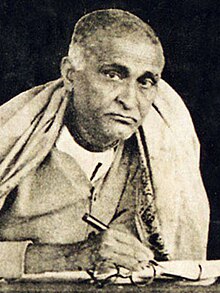Gaudiya Math
গৌড়ীয় মঠ | |
 | |
| Successor | Gaudiya Missionand Sri Chaitanya Math |
|---|---|
| Established | 6 September 1920 |
| Founder | Bhaktisiddhanta Sarasvati |
| Founded at | Calcutta,British India |
| Dissolved | 1937 |
| Type | Religious organization |
| Purpose | Educational,Philanthropic,Religious studies,Spirituality |
| Headquarters | Calcutta, British India |
| Location |
|
Region served | British India British Burma London,UK Berlin,Germany |
Official languages | Bengali,English |
| Affiliations | Gaudiya Vaishnavism |

| Part ofa serieson |
| Vaishnavism |
|---|
 |
TheGaudiya Math(/mʌt/,/mɑːt/;Gauḍīya Maṭha) is aGaudiya Vaishnavamatha(monastic organisation) formed on 6 September 1920,[2][1]about 30 months afterBhaktisiddhanta Sarasvatitooksannyasa,the renounced order of life. On 7 March 1918,[2]the same day he tooksannyasa,he established the Sri Chaitanya Math inMayapurain West Bengal, later recognised as the parent body of all the Gaudiya Math branches.[2]Its purpose was to spreadGaudiya Vaishnavism,the philosophy of the medievalVaisnavasaintChaitanya Mahaprabhu,through preaching andpublishing.
From the beginning of Chaitanya'sbhakti movementin Bengal, devotees, includingHaridasa Thakurand others, whetherMuslimorHinduby birth, have been participants. This openness and disregard for the traditional caste received a boost from the "broad-minded vision" ofBhaktivinoda Thakura,[3]a nineteenth-century magistrate and prolific writer onbhaktitopics, and was institutionalised by his son and successor Bhaktisiddhanta Sarasvati Thakura in the twentieth-century Gaudiya Math.[3]
Branches[edit]

The Gaudiya Math had established 64 branches.[2]Most were in India, but preaching centres were maintained for a time inBritish Burma,EnglandandGermany.[1][4]The first European preaching center was established inLondonin 1933 (London Glouster House, Cornwall Garden, W7 South Kensington) under the name Gaudiya Mission Society of London'. Lord Zetland, the English Secretary of State, was the president of this society.[4][5] The second European preaching center was opened bySwami B.H. Bon MaharajinBerlin(W30 Eisenacherstr. 29).
History[edit]
Soon after the Srila Bhaktisiddhanta Saraswati's death (1 January 1937), a dispute began and the original Gaudiya Math mission divided by the court in 1948 into two administrative bodies which continued preaching on their own, up to the present day. In a settlement they divided the 64 Gaudiya Math centers into two groups.[6]Sri Chaitanya Math Branch were headed by Srila Bhakti Vilasa Tirtha Maharaj.Gaudiya Mission[7]were headed by Ananta Vasudev Prabhu, who became known as Srila Bhakti Prasad Puri Maharaj after acceptingsannyasafor short duration.[8]
Many of the disciples ofBhaktisiddhanta Sarasvatidid not agree with the spirit of these newly created two fractions, or were simply inspired to expand the mission of their guru on their own enthusiasm, started their own missions. Many of these autonomous missions are still known as Gaudiya Math. Some of the other notable new missions are:[5]
- Sri Gaudiya Vedanta Samitiestablished byBhakti Prajnan KeshavaMaharaj andBhakti Rakshak SridharGoswami Maharaj (1940)[9]
- Sri Chaitanya Saraswat Mathestablished byBhakti Rakshak SridharMaharaj (1941)[10]
- Sri Chaitanya Gaudiya Mathestablished by Srila Bhakti Dayita Madhav Goswami Maharaj (1953)[11]
- International Society for Krishna Consciousnessestablished byA. C. Bhaktivedanta Swami Prabhupada(1966)[12]
- Sri Krishna Chaitanya Missionestablished by Srila Bhakti Vaibhava Puri Goswami Maharaj (1966)[13]
- Science of Identity Foundationestablished by Siddhaswarupananda Paramahamsa (1977)[14]
- Sri Sri Radha Govindaji Trustestablished by SrilaBhakti Hridaya Bon(1979)
- Sri Caitanya Sangha, a.k.a. Gaudiya Vaishnavite Society, established by Tripurari Swami (1985)[15]
- Sri Gopinatha Gaudiya Mathestablished by Srila Bhakti Pramode Puri Goswami Maharaj (1989)[16]
Some are very large missions, and some are smaller branches started by individual Vaishnavas. What they hold in common is that they are autonomous branches of the tree of the Gaudiya Math. Almost all of them have published books and periodicals and opened one or more temples.[5]There is little cooperation among these missions.[17]Nevertheless, in 1994 many of them formed united theWorld Vaisnava Association — Visva Vaisnava Raj Sabha(WVA–VVRS).[17][18]
References and notes[edit]
- ^abcSherbow, Paul H. (2004)."A.C. Bhaktivedanta Swami's Preaching in the Context of Gaudiya Vashnavism".InBryant, Edwin F.;Ekstrand, Maria L. (eds.).The Hare Krishna Movement: The Postcharismatic Fate of a Religious Transplant.New York:Columbia University Press.pp. 129–46.ISBN0-231-12256-X.Archivedfrom the original on 22 April 2023.Retrieved10 February2022.p. 130.
- ^abcdDevamayī dāsi, "A Divine Life: Śrīla Bhaktisiddhānta Saraswatī Ṭhākura Prabhupāda" inPrabhupada Saraswati Thakur: The Life & Precepts of Śrīla Bhaktisiddhānta Saraswatī,Mandala Publishing, Eugene, Oregon: 1997, pp. 24, 26, 49.ISBN978-0-945475-10-1.
- ^abSherbow 2004,p. 139.
- ^abJones, Constance A.; Ryan, James D. (2007)."Gaudiya Math".Encyclopedia of Hinduism.Encyclopedia of World Religions.J. Gordon Melton,Series Editor. New York: Facts On File. p. 165.ISBN978-0-8160-5458-9.Archived from the original on 20 October 2022.Retrieved10 February2022.
{{cite encyclopedia}}:CS1 maint: bot: original URL status unknown (link) - ^abcSwami B. A. Paramadvaiti (1999).Our Family — the Gaudiya Math. A study of the expansion of Gaudiya Vaisnavism and the many branches developing around the Gaudiya Math.VRINDA The Vrindavan Institute for Vaisnava Culture and Studies.ISBN3-927745-90-1.Archivedfrom the original on 13 April 2019.Retrieved20 December2018.
- ^Sherbow 2004,p. 131.
- ^Gaudiya Mission official website
- ^Brzezinski, Jan (2004)."Charismatic Renewal and Institutionalization in the History of Gaudiya Vashnavism and the Gaudiya Math".InBryant, Edwin F.;Ekstrand, Maria L. (eds.).The Hare Krishna Movement: The Postcharismatic Fate of a Religious Transplant.New York:Columbia University Press.pp. 73–96.ISBN0-231-12256-X.Archivedfrom the original on 22 April 2023.Retrieved10 February2022.p. 89.
- ^Sri Gaudiya Vedanta Samiti official website
- ^Sri Chaitanya Saraswat Math official website
- ^Sri Chaitanya Gaudiya Math official website
- ^International Society for Krishna Consciousness official website
- ^Sri Krishna Chaitanya Mission official website
- ^Science of Identity Foundation official website
- ^Gaudiya Vaishnavite Society (Sri Caitanya Sangha) official website
- ^Sri Gopinatha Gaudiya Math official website
- ^abBrzezinski 2004,p. 90.
- ^Jones & Ryan 2007,pp. 504–505.

